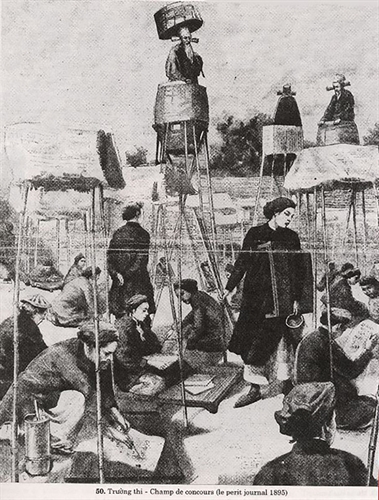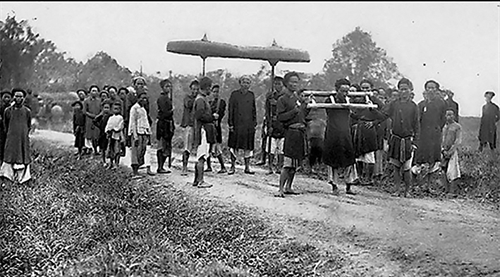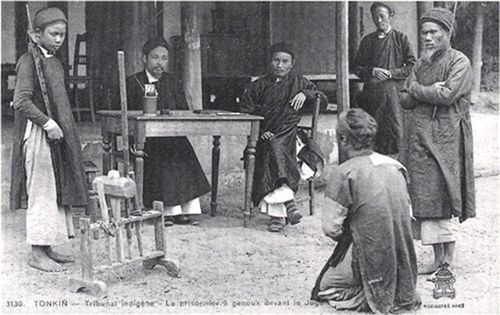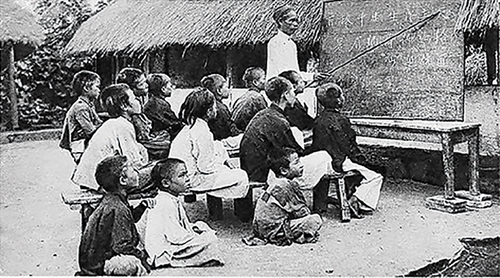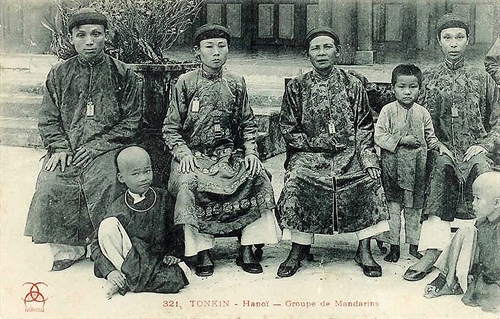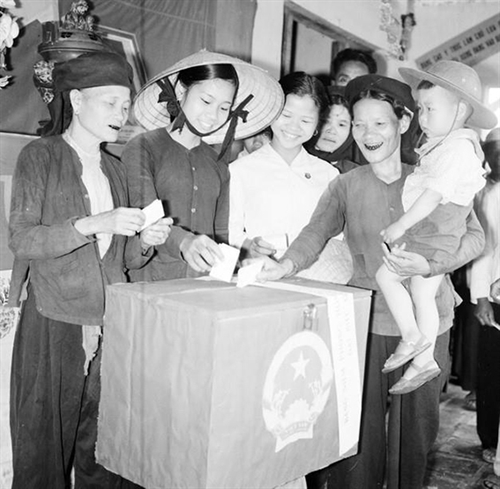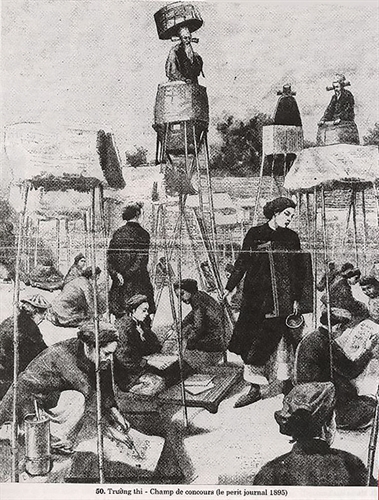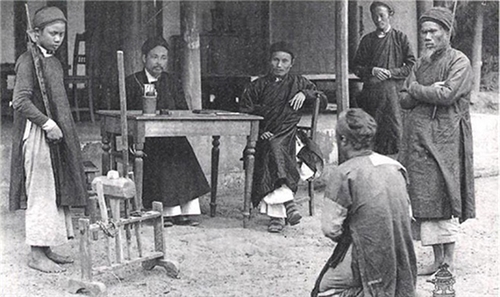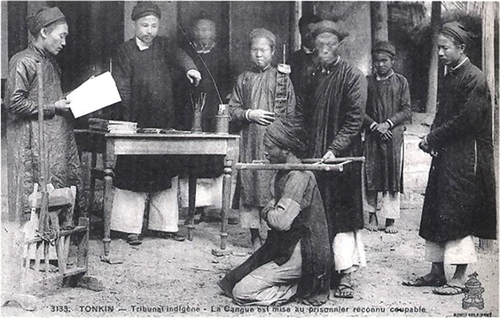Nguyen Phuc Nam Duong
The Confucian ideology of superior-inferior relationship between men and women has deeply influenced Vietnam’s feudal society, further enhancing the dominance of men and harsh treatment of women. According to the Confucian theory of “Three Obediences: women were to be obedient to the father when young, to the husband when married, and to the sons when widowed”, a woman had no independent position, having to rely on a man from cradle to grave.
Until the Nguyen Dynasty, although Confucianism continued to prevail, dominating all aspects of the country, King Gia Long paid more appreciation to the role of women, especially their status in the family, by introducing a strict and progressive code titled Hoang Viet Luat Le or Gia Long Code.
Continuation and modification
Gia Long Code, compiled by the Northern Citadel Governor Nguyen Van Thanh and promulgated by King Gia Long in 1815 - 13 years after the founding of the Nguyen Dynasty, was the official code of Vietnam in the early Nguyen Dynasty and continued to be applied in the Central Vietnam during the French colonial period.
The Code had 22 volumes, 398 articles and 30 articles cited, divided into seven chapters, was built mainly on the basis of referring to the provisions of the Qing Dynasty (China) and Hong Duc Code (Criminal Code of the late Le Dynasty). Although much of it was copied, the law was adjusted and updated to suit the specific political, economic, cultural and social conditions of Vietnam at that time.
The Code was also divided into six categories, corresponding to the functions of six ministries: Hinh (in charge of adjudication), Lai (in charge of promotion, appointment, recruitment, legal affairs, training and mandarins), Ho (in charge of marriage and family, real and personal estates), Le (in charge of foreign affairs and royal ceremonies), Binh (in charge of military affairs), and Cong (in charge of public works). It applied to all subjects, including also foreigners living in the country’s territory.
Before the founding of the Nguyen Dynasty, Vietnam already had laws that eased the harshness of Confucian thought. The Hong Duc Code, promulgated in 1478, already defended many women’s interests. Regarding marriage, only when the woman consented could the marriage take place. Or if the husband was away from home for more than five months without visiting his wife, he could lose his wife. The daughter’s right to inherit the estate left by her parents was also guaranteed. If the family did not have any son, the eldest daughter would enjoy the inheritance and worship her ancestors like the eldest son.
And after ascending the throne, King Gia Long continued to apply the Hong Duc Code before the new Code of the Nguyen Dynasty was promulgated.
A new step forward in feminism
Under the reign of King Gia Long, although Confucianism still prevailed, feminism took a new step forward. It was not because women sparked protests demanding their rights like in the West in the 19th and 20th centuries. But this advance was resulted from a new law promulgated by the king himself - a man living in a feudal state, ruling his country with Confucian thought. The new Code was formed in a country that upheld Confucian teachings but opposed to the backward oppression of women advocated by Confucianism itself.
The more important the rights and status of women were, the more they were protected by the law, especially their role in the family was lifted. The woman in the family at that time was no longer simply a housewife who was expected to help her husband take care of family affairs and manage property, but moreover, was elevated as an “internal minister”.
Considered an “internal minister”, thus, the wife was accorded by the law the same status as her husband. Regarding property management in the house, for example, the wife would not only help her husband but also share the property management responsibility. If the husband sold his wife’s property without the consent of the owner, he would be brought to court by the wife’s parents. Therefore, nobody would buy a property if the wife refused to sign or press her fingerprint to the sale contract.
In the past, it was common for a man to have more than one wife. But in King Gia Long’s time, the law would not recognize polygamy for families that already had a son. Only when the wife was infertile or could not bear a son, then, with the consent of the wife, the husband could get a concubine. Sometimes the first wife herself found a concubine for her husband. But unfortunately for the concubine, she did not have the same position in the family as the official wife, having the only duty of giving birth to a son.
A man could still have the right to divorce if his wife committed one of the following seven things: infertility, jealousy, cruelty, lust, disrespect to grandparents and parents, causing discord in the family, and theft. But he could not leave his wife in three cases. First, the wife had mourned her husband’s parents; second, the wife made the family rich; third, the wife had nobody except the husband to rely on. A husband who divorced his wife without a plausible reason would be severely punished by the law.
If the husband left his wife for three years without informing the mandarin in advance, he would be subject to the penalty of 80 beatings with a heavy stick; if he married another wife without his official wife’s consent, he would be beaten 100 times with a heavy stick. Such a punishment aimed to make men more conscious and responsible to women, paying more attention to their families. A husband had the right to divorce in the case his wife committed adultery. Besides, if committing adultery, both men and women would face strict punishments, such as being stamped by an elephant, thrown into a river, or tied to a bamboo raft put on a river.
Particularly, the law prohibited fraudulent acts in marriage. Kidnapping wives, selling girls as concubines or giving them to noble families were all subject to hanging.
Gia Long Code also severely punished those who showed disrespect to women. Those who used vulgar language to insult women, leading them to committing suicide, would be sentenced to imprisonment and strangling. If a man said some obscene words without intentionally insulting a woman, but still made her feel ashamed and commit suicide, he would be punished by 100 beatings with a heavy stick and sent into exile 3,000 miles away.
In the old feudal society, due to the concept of male dominance, women had to suffer many disadvantages, with their rights still limited to the family, and could not participate in major and important jobs. But to a certain extent, Gia Long Code had provided more favorable treatment to women, respecting and enhancing their dignity and roles.
With their merits of protection of women clearly stated in Gia Long Code, it is perhaps not an exaggeration to honor King Gia Long and the Governor of the Northern Citadel Nguyen Van Thanh as “feminists in the feudal society”.-
The Confucian ideology of superior-inferior relationship between men and women has deeply influenced Vietnam’s feudal society, further enhancing the dominance of men and harsh treatment of women. According to the Confucian theory of “Three Obediences: women were to be obedient to the father when young, to the husband when married, and to the sons when widowed”, a woman had no independent position, having to rely on a man from cradle to grave.
Until the Nguyen Dynasty, although Confucianism continued to prevail, dominating all aspects of the country, King Gia Long paid more appreciation to the role of women, especially their status in the family, by introducing a strict and progressive code titled Hoang Viet Luat Le or Gia Long Code.
Continuation and modification
Gia Long Code, compiled by the Northern Citadel Governor Nguyen Van Thanh and promulgated by King Gia Long in 1815 - 13 years after the founding of the Nguyen Dynasty, was the official code of Vietnam in the early Nguyen Dynasty and continued to be applied in the Central Vietnam during the French colonial period.
The Code had 22 volumes, 398 articles and 30 articles cited, divided into seven chapters, was built mainly on the basis of referring to the provisions of the Qing Dynasty (China) and Hong Duc Code (Criminal Code of the late Le Dynasty). Although much of it was copied, the law was adjusted and updated to suit the specific political, economic, cultural and social conditions of Vietnam at that time.
The Code was also divided into six categories, corresponding to the functions of six ministries: Hinh (in charge of adjudication), Lai (in charge of promotion, appointment, recruitment, legal affairs, training and mandarins), Ho (in charge of marriage and family, real and personal estates), Le (in charge of foreign affairs and royal ceremonies), Binh (in charge of military affairs), and Cong (in charge of public works). It applied to all subjects, including also foreigners living in the country’s territory.
Before the founding of the Nguyen Dynasty, Vietnam already had laws that eased the harshness of Confucian thought. The Hong Duc Code, promulgated in 1478, already defended many women’s interests. Regarding marriage, only when the woman consented could the marriage take place. Or if the husband was away from home for more than five months without visiting his wife, he could lose his wife. The daughter’s right to inherit the estate left by her parents was also guaranteed. If the family did not have any son, the eldest daughter would enjoy the inheritance and worship her ancestors like the eldest son.
And after ascending the throne, King Gia Long continued to apply the Hong Duc Code before the new Code of the Nguyen Dynasty was promulgated.
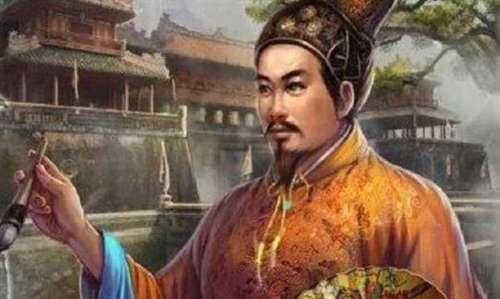 |
| A portrait painting of King Gia Long__Photo: Internet |
A new step forward in feminism
Under the reign of King Gia Long, although Confucianism still prevailed, feminism took a new step forward. It was not because women sparked protests demanding their rights like in the West in the 19th and 20th centuries. But this advance was resulted from a new law promulgated by the king himself - a man living in a feudal state, ruling his country with Confucian thought. The new Code was formed in a country that upheld Confucian teachings but opposed to the backward oppression of women advocated by Confucianism itself.
The more important the rights and status of women were, the more they were protected by the law, especially their role in the family was lifted. The woman in the family at that time was no longer simply a housewife who was expected to help her husband take care of family affairs and manage property, but moreover, was elevated as an “internal minister”.
Considered an “internal minister”, thus, the wife was accorded by the law the same status as her husband. Regarding property management in the house, for example, the wife would not only help her husband but also share the property management responsibility. If the husband sold his wife’s property without the consent of the owner, he would be brought to court by the wife’s parents. Therefore, nobody would buy a property if the wife refused to sign or press her fingerprint to the sale contract.
In the past, it was common for a man to have more than one wife. But in King Gia Long’s time, the law would not recognize polygamy for families that already had a son. Only when the wife was infertile or could not bear a son, then, with the consent of the wife, the husband could get a concubine. Sometimes the first wife herself found a concubine for her husband. But unfortunately for the concubine, she did not have the same position in the family as the official wife, having the only duty of giving birth to a son.
A man could still have the right to divorce if his wife committed one of the following seven things: infertility, jealousy, cruelty, lust, disrespect to grandparents and parents, causing discord in the family, and theft. But he could not leave his wife in three cases. First, the wife had mourned her husband’s parents; second, the wife made the family rich; third, the wife had nobody except the husband to rely on. A husband who divorced his wife without a plausible reason would be severely punished by the law.
If the husband left his wife for three years without informing the mandarin in advance, he would be subject to the penalty of 80 beatings with a heavy stick; if he married another wife without his official wife’s consent, he would be beaten 100 times with a heavy stick. Such a punishment aimed to make men more conscious and responsible to women, paying more attention to their families. A husband had the right to divorce in the case his wife committed adultery. Besides, if committing adultery, both men and women would face strict punishments, such as being stamped by an elephant, thrown into a river, or tied to a bamboo raft put on a river.
Particularly, the law prohibited fraudulent acts in marriage. Kidnapping wives, selling girls as concubines or giving them to noble families were all subject to hanging.
Gia Long Code also severely punished those who showed disrespect to women. Those who used vulgar language to insult women, leading them to committing suicide, would be sentenced to imprisonment and strangling. If a man said some obscene words without intentionally insulting a woman, but still made her feel ashamed and commit suicide, he would be punished by 100 beatings with a heavy stick and sent into exile 3,000 miles away.
In the old feudal society, due to the concept of male dominance, women had to suffer many disadvantages, with their rights still limited to the family, and could not participate in major and important jobs. But to a certain extent, Gia Long Code had provided more favorable treatment to women, respecting and enhancing their dignity and roles.
With their merits of protection of women clearly stated in Gia Long Code, it is perhaps not an exaggeration to honor King Gia Long and the Governor of the Northern Citadel Nguyen Van Thanh as “feminists in the feudal society”.-
